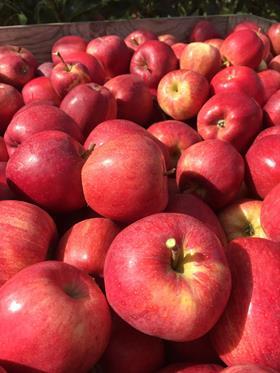
As the British topfruit season draws to a close, growers will reflect on a solid year that has underlined apples’ and pears’ place in the hearts of consumers.
Sales rose slightly, with 1.4 per cent price inflation helping add £10.4 million to the category [Kantar, 52 w/e 24 February 2019], but that may have also contributed to volumes slipping 0.5 per cent.
Overall, the category remains robust, with apples still the nation’s most popular fruit or vegetable item, and growers are continuing to invest in the category. “The strong results of the past apple season demonstrate that the category is performing well and we were delighted that apples regained their top spot as the nation’s favourite fruit last year,” says Ali Capper, executive chair of English Apples & Pears. With research showing that nine out of 10 shoppers who expressed a preference saying they would buy British apples whenever possible, the opportunity seems clear, she adds.
Growers are seizing the initiative with expanded planting programmes, with AC Goatham & Son accelerating its own investment in the past year. “We are continuing planting apples and pears, aiming to plant 380,000 new trees this year,” says commercial director Carol Ford. “We have also just acquired our 28th farm here in Kent. We have a new apple variety coming to the market later this year which will be a phased rollout due to supply. More details will be available when it is launched later this year but we are very excited – it is a British first.”
Among the brands, Pink Lady reports that the northern hemisphere season has so far performed better than expected, with sales up to February 12 per cent higher than last year and having improved each month after a slow start to the season. Growing conditions in key supply sources South Africa and New Zealand are also said to be good, with an attractive crop having been noted following winter rain in the former.
On the production front, labour continues to be the number-one issue vexing growers, and Capper, who is also chair of the NFU’s horticulture board, says EAP will be lobbying government hard to ensure the industry will continue to have access to labour. Given the seemingly endless Brexit uncertainty, growers have little choice but to go about their business under the existing arrangements and hope that the outcome allows them access to seasonal workers as we move into the key spring and summer harvesting period.
The industry hopes a major new health-focused campaign will inject further impetus into the category (see page 14), while Pink Lady is also running a ‘Taste the Wow’ promotion that positions the club variety as “the ultimate, healthy indulgence, aligning well with the consumer mindset of investing money in premium, healthy food.”
Leading brand Pink Lady is also planning to keep itself in the public eye with a number of high-profile sponsorships, according to UK marketing manager Lynn Shaw. These include the London Marathon, the Food Photographer of the Year Awards, the Guild of Food Writers’ ‘Write It’ competition and Digital Pride with Gay Star News.
The top-fruit industry, much like others across the fruit sector, sees real opportunity in taking sales from processed snacks and adding incremental growth to the category. With an alarming EAP study showing the average adult in Britain racks up more than 1,400 calories a day in unhealthy snacking outside of mealtimes, there’s ample potential for that.






No comments yet